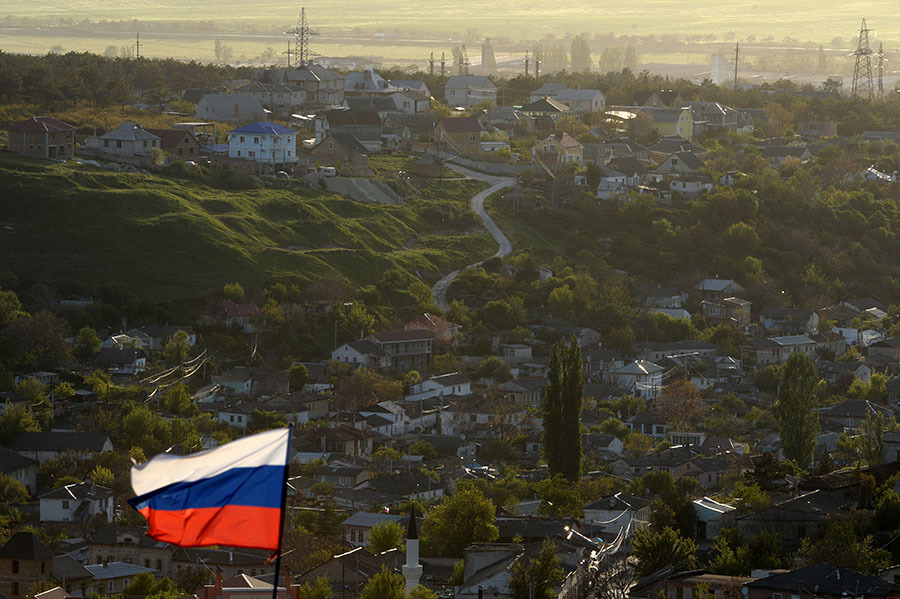The statement of the first President of Ukraine Leonid Kravchuk about Kiev's readiness to negotiate with Moscow on the Crimea issue looks strange, since it is a subject of the Russian Federation.
This opinion was expressed in an interview with RT by the first deputy chairman of the Federation Council committee on international affairs Vladimir Dzhabarov.
He also doubted the readiness of the Ukrainian side to conduct a constructive dialogue on Donbass.
“Our position is as follows: the issue of Crimea and Sevastopol is closed and not subject to discussion.
These are the regions of the Russian Federation.
This is the first thing.
Second: to be honest, I don't really believe his words ... And the most important thing is that he did not explain what exactly he wants, ”said Dzhabarov.
In turn, Anton Morozov, a member of the State Duma Committee on International Affairs, also stated that “Crimea has been reunited with Russia once and for all”, therefore “there are no more options for any discussion”.
“All that we are interested in discussing with Kiev are issues related to Donbass.
The fact that now the Kiev regime, in fact, has withdrawn itself from this process, does not suit anyone: neither Russia nor the European community.
Still, it is necessary to find options to ensure peace in the Donbass and to resolve the humanitarian and socio-economic catastrophe that has developed there, "said the interlocutor of RT.
On the eve of the current representative of Ukraine in the trilateral contact group on the settlement of the conflict in Donbass Leonid Kravchuk assessed the possibility of "reconciliation" between Kiev and Moscow, including on the issue of the Crimean Peninsula.
“Crimea is a separate topic for conversation, Donbass is also a separate topic.
We have been trying for seven years to agree on Donbass, but we cannot.
I am not saying that Ukraine is perfectly right in everything.
But Ukraine is ready to compromise.
In the format of dictatorship, accusations and demands on Ukraine, no agreements are feasible.
This is a road to a remote corner, ”he said in an interview with NSN.
Kravchuk's comments appeared after the decision of the European Court of Human Rights regarding Ukraine's complaint against Russia in Crimea.
On January 14, the ECHR declared the complaint partially admissible and will continue its consideration.
At the same time, the court concluded that a number of accusations brought forward by Kiev against the Russian Federation were not proven.
We are talking about alleged cases of murder of civilians, groundless detention of foreign journalists, illegal seizure of property of the Ukrainian military.
In addition, the court found unproven accusations of discrimination against ethnic Ukrainians, politically motivated criminal prosecution of pro-Ukrainian persons, refusals to register religious and other organizations.
In 2014-2015, Ukraine submitted to the ECHR two complaints against Russia, they related to the events in Donbass and the reunification of Crimea with Russia.
Later, these cases were combined into one proceeding.
"The necessary argumentation about the groundlessness of the relevant claims and supporting evidence were presented by the Russian Ministry of Justice to the ECHR in the course of the exchange of legal positions, including during public hearings held in the Grand Chamber of the ECHR in September 2019," the Russian Ministry of Justice emphasized.
Crimea became a Russian region after a referendum was held there in March 2014, in which the vast majority of residents voted for reunification with Russia.
View of Bakhchisarai in the South Crimea
RIA News
© Konstantin Chalabov
On January 14, 2021, Russia's Permanent Representative to the Council of Europe Ivan Soltanovsky noted that there is no ethnic tension in Crimea, despite the fact that representatives of the Armenian, Bulgarian, Ukrainian, Greek, Crimean Tatar, Italian and German communities live on the peninsula.
“Over the past six years, Russia has actively contributed to strengthening the socio-economic, cultural, religious rights of national minorities living in Crimea,” TASS quotes the text of the statement.
In turn, Permanent Representative of the Russian Federation to the OSCE Alexander Lukashevich responded to the statement by the current chairman of the continental organization, Swedish Foreign Minister Ann Linde.
Earlier, she stated that the resolution of the conflict in Ukraine must be achieved in accordance with the principles of the OSCE, as well as with full respect for the sovereignty, territorial integrity and independence of Ukraine in its "within its internationally recognized borders, including the Autonomous Republic of Crimea and the city of Sevastopol."
“We reject your, dear Madam Acting Chairperson, your statement on Crimea.
The peninsula has become an integral part of the Russian Federation as a result of the democratic choice of the people in full accordance with international law, ”the diplomat recalled.

